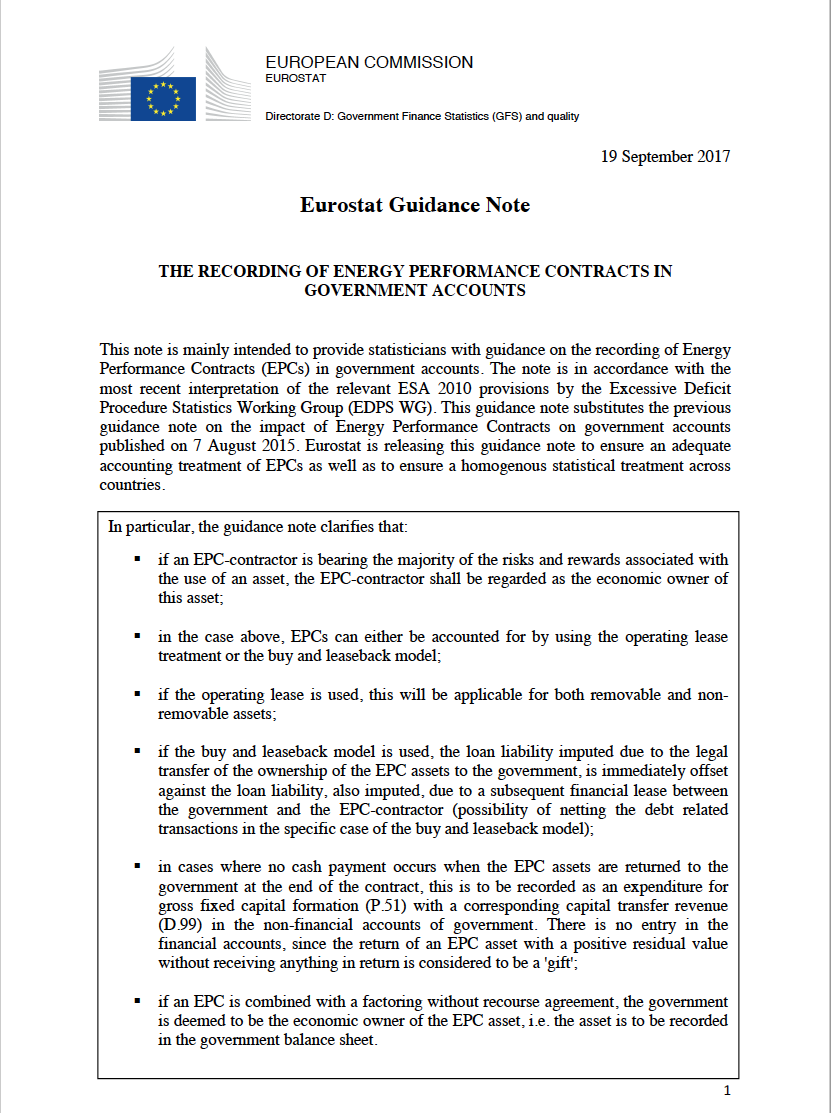
Eurostat, the Statistical Office of the European Commission, has published today an updated guidance note on the recording of energy performance contracts (EPCs) in government accounts.
The revised guidance note clarifies the accounting rules applied to the treatment of energy performance contracts. It follows up on the work already undertaken by Eurostat to clarify the accounting rules for various types of public investment, including the Guide to the Statistical Treatment of Public Private Partnerships published last year.
Marianne Thyssen, Commissioner for Employment, Social Affairs, Skills and Labour Mobility, and responsible for Eurostat, said: “Europe needs investments. With this guidance we show how public authorities can invest in full respect of the principles of public accounting, now also in the energy sector. Facilitating investments in energy efficiency measures has also an important social function, as public buildings such as social housing facilities will benefit from it too.”
Miguel Arias Cañete, Commissioner for Climate Action and Energy said: “Energy efficiency first: from words to action. Thanks to the revised guidance published today, it will be easier for schools, hospitals, and other public buildings – which make up more than 10% of the overall EU building stock – to invest for the purpose of improving energy efficiency. Energy efficiency measures are also an important means to combat energy poverty, which this Commission aims at tackling at the roots.”
Energy performance contracts in the public sector offer a practical solution to make public buildings and other public infrastructures more energy efficient, as the initial investment can be covered by a private partner and repaid by guaranteed energy savings. However, frequently this type of contract simultaneously contains elements of a rental, service, lease, purchase or loan agreement, making its recording complex. At the request of Member States, Eurostat has worked with National Statistical Institutes (NSIs) to reflect on the most appropriate recording of EPCs in government accounts, resulting in the guidance note published today.
The guidance note is available to download here.
Background
In November 2016 the European Commission put forward the “Clean Energy for All Europeans” package aiming to keep the European Union competitive as the clean energy transition is changing global energy markets. Central elements of this package were ambitious proposals on energy efficiency as our first fuel. Energy efficiency reduces energy bills and the dependency on imports, while creating local jobs. But it also requires significant upfront investment, particularly with regards to the refurbishment of buildings. Energy performance contracts (EPCs) can help the building sector increase the necessary investments in the context of increasing private investor interest and fast developing expertise.
The Eurostat guidance note published today on the accounting treatment of EPCs significantly increases the possibilities for public bodies to use such contracts, by including and clarifying the circumstance in which these contracts can be recorded off government balance sheets. In this way, the updated guidance paper is also in line with the third pillar of the Juncker Plan, which aims at removing regulatory barriers to investment. It also paves the way for the development of a stronger market of EPC providers, involving many SMEs. According to data collected by European PPP Expertise Centre (EPEC), over the last five years 345 new public-private partnership projects concerning energy performance were signed in 16 EU Member States, for the total value of over €65 billion.
The updated guidance note will help Member States’ National Statistical Institutes (NSIs) to better understand the impact energy efficiency investments have on government balance sheets. The note provides guidance to statisticians regarding the interpretation of certain ESA 2010 provisions – the European System of Accounts – in the case of EPCs, more specifically those EPCs which require an initial capital expenditure to improve the energy efficiency of a facility. EPCs where the energy efficiency is obtained through energy management measures, without any investment in equipment addition or renewal, are treated as simple service or maintenance contracts. This revised guidance is applied in cases where the EPC-contractor can be considered as the economic owner of the asset.
Technical assistance facilities like the European Investment Advisory Hub set-up by the European Investment Bank (EIB) and the Commission will use this guidance note to assist in any potential request. The note will be backed up by a Practitioner’s Guide jointly produced by Eurostat and the European PPP Expertise Centre (EPEC) of the EIB, which will be published by the end of the year.
Eurostat is the Directorate-General of the European Commission providing statistical information to the institutions of the European Union (EU) and promoting the harmonisation of statistical methods across its member states. The organisations in the different countries which actively cooperate with Eurostat are summarised under the concept of the European Statistical System.
